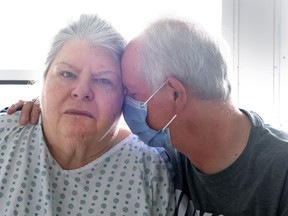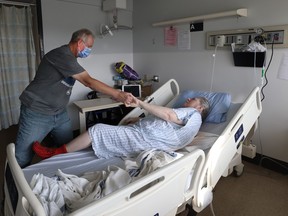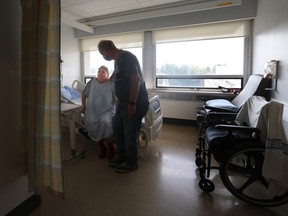The husband continues to attend the hospital every day to help care for his wife. A note on the board in her room says she is to be moved on September 30th. “I won’t let them take her,” he said.

Article content
A Surrey chief is questioning why health authorities intervened to move his wife, who suffers from a rare degenerative brain disease, into a care home against what he says is her wishes and best interests.
Jackie Cameron, 64, was diagnosed in June 2023 with Progressive Supranuclear Palsy, an incurable disease that affects walking, balance, movement and executive function, causing her great frustration that sometimes leads to crying, screaming and involuntary movements.
Advertisement 2
Article content
Doctors have told the couple she may only have six months to a year to live.
“I want to do everything I can to make the best of what Jackie has left,” said her husband, Rick Zeller, 66.
In December 2023, Cameron was admitted to Surrey Memorial Hospital with a bowel obstruction. She recovered, but the hospital will not release her to his care, Zeller said.
Zeller said social workers from the Fraser Health Authority encouraged him to place her in a nursing home.
“I said no.”
He wants to take her home and care for her with the help of home aides, as he did before her admission.
An evaluation by a registered social worker at Surrey Memorial, dated July 24 and provided to Postmedia News by Zeller, stated that Cameron stated she did not want to go to a nursing home and “started crying and screaming” when asked about it .
Zeller said he visits his wife daily, helping her out of bed and into her wheelchair to go to the bathroom — just like he does at home — and calming her down when she gets agitated.

He repeats the promise he made when they signed an attorney agreement after her diagnosis, naming him as her “substitute decision maker” for health care: She would never go into long-term care.
Article content
Advertisement 3
Article content
But on Sept. 4, Zeller was sent a letter stating that the BC Trustee and Trustee had determined that he “does not qualify” for a substitute decision maker.
The Public Guardian and Trustee, a public agency designed to help vulnerable individuals, has the authority to intervene if it believes a vulnerable adult is facing abuse or neglect or is unable to make an informed decision.
Under the Health Care (Consent) and Care Institution (Admission) Act, the agency can engage in temporary substitute decision-making if an adult is unable to give consent for health care and no one else is authorized or able to fulfill it. role as a decision-making substitute.
To be competent to grant or withhold surrogate consent as required by law, a person must “be prepared to make a decision with the best interests of the adult in mind”.
Zeller and Cameron learned that the agency had stepped in as a new substitute decision maker and was agreeing on her behalf to admit her to Care Life Fleetwood, a long-term care facility.
The Public Guardian advised Zeller to seek legal advice if he disagreed.
Advertisement 4
Article content
Jonathan Blair, a human rights lawyer in Vancouver, said delegation agreements to name substitute decision-makers are not set in stone.
Blair could not comment on Zeller’s case and does not represent Zeller, but said such agreements are restrictive and authorities can override them under certain circumstances.
“These situations can be very complex,” he said.
A substitute decision maker must act in the person’s best interests and understand that those interests may change over time as their health needs change.
“The process that the (guardian and trustee) use to make their decisions should be transparent,” Blair said. “With the health authorities, it is often very unclear for those who are taken under control, both patient and loved one, to know what they can do next, how they can object to this or get more information.
Zeller said the push to put Cameron in a nursing home began after her admission to Surrey Memorial when social workers noticed scratches on her face.
Compulsive movements, including scratching for bleeding, have been reported in PSP patients in a study published in the National Library of Medicine.
Advertisement 5
Article content
Zeller said his wife was interviewed by a social worker while heavily medicated and without a nurse or doctor present.
“I was accused of hitting her,” Zeller said. “That’s just not true.”

“They investigated … they closed the case. He’s not abusing her, he’s not neglecting her,” said a Fraser health worker, whose name is being withheld because they are not authorized to comment publicly on the case.
“I think they should send her home,” said the doctor, who is familiar with Cameron’s case and has watched Zeller care for his wife. “They can get support at home.”
Nevertheless, the social workers contacted the guardian and trustee.
Fraser Health officials told Postmedia they could not speak to the details of Cameron’s care, but confirmed that BC’s guardian and trustee were involved.
A guardian and trustee would not comment on Cameron’s case, citing privacy concerns, but said that since Part 3 of the Health Services (Consent) and Care Facilities (Admissions) Act came into force in November 2019, the agency had received more than 1,100 requests to grant consent for placement in a residential home.
Advertisement 6
Article content
In approx. In 60 percent of the cases, the agency appeared as a substitute decision-maker for the care home.
In November 2023, BC Human Rights Commissioner Kasari Govender launched an inquiry into involuntary detention under the Adult Custody Act, which outlines the decision-making process for institutional care admissions, including who makes the decision.
The commissioner has ordered seven health agencies across the province, including Fraser Health and the Public Guardian and Trustee, to release data on involuntary detention of adults, including whether the law allows designated agencies to hold adults in care without their consent.
“I cannot understate the importance of ensuring that (adult custody laws) strike a fair balance between ensuring the safety of vulnerable adults and respecting their autonomy,” Govender said in a news release.
The report will be published in the new year.
Meanwhile, Zeller continues to show up at the hospital every day to help care for his wife. A note on the board in her room says she is to be moved on September 30th.
Advertisement 7
Article content
“I’m not letting them take her,” Zeller said.
dryan@postmedia.com
Recommended by the editorial board
-

BC seniors threatened with eviction from retirement homes due to service fee hike, seniors’ advocate says
-

Daphne Bramham: Improving the lives of severely disabled people should be good news, but isn’t
Bookmark our website and support our journalism: Don’t miss the news you need to know – bookmark VancouverSun.com and TheProvince.com and sign up for our newsletters here.
You can also support our journalism by becoming a digital subscriber: For just $14 a month, you can get unlimited access to The Vancouver Sun, The Province, National Post and 13 other Canadian news sites. Support us by subscribing today: The Vancouver Sun | The province.
Article content
#woman #rare #illness #forced #move #nursing #home #husband